Up in that choked-out periwinkle haze the moon is a rose gold fingernail. All the cell towers flicker their tuneless percussion, just behind the graying tree-line. Did you do it right? Did you do the right thing? You promised yourself right at the beginning of summer that you’d savor it. The longer days. The slower sunsets. What do you do when you find yourself somewhere unexpected—turning into someone unrecognizable—doing what you can—and then you’re on the same road you’ve driven for months now (when did it become months now) with someone you hardly thought of until—
If the light turns yellow when you’ve finally caught a stride, will you slow down or speed up? You missed the meteor shower even though it rescheduled. Even the stars procrastinate now.
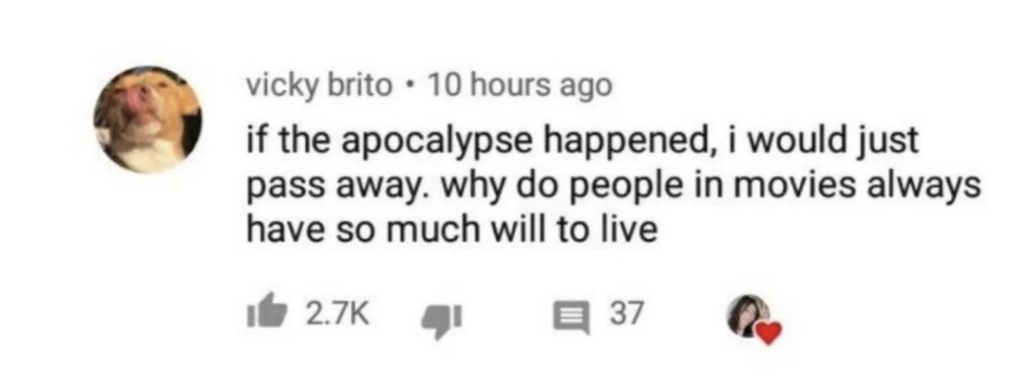
At some point, you realize you’re in it. The end of everything. It clicks for you at the weirdest time. You’ve known since birth, of course. You were told. Day in, day out. “This shit won’t last. Don’t get attached.” But being told something is different than actually living it. Sure, it made you weird. Your first couple of heartbreaks felt worse than anything in the world and you screamed bloody murder because you knew deep down you needed people. Every lost friendship reverberated throughout your lifeline until you smushed your palm against the wallpaper of your playroom and growled “enough. Enough.”
And the irony there is that you roll your eyes at other adults who scream and cry and claim they’re “grieving” a breakup (three month poly non-attached situationship) because now you’ve got all these dead people in your head and you’re never gonna hear their voices in real time again, or taste their food, or talk shit about them in a way that matters. But you’re scrupulous with that, too. You know to be wary of any attrition to your ethical and compassionate faculties. Just because you’ve got a broken leg and someone else has a cold doesn’t mean you’re not both hurting.
So you force yourself out of bed on a Monday after losing sleep Sunday night. You get in your car and you listen to the growl and the gurgle of it, as if it’s drowning in its own fluids. You look at all the lights in your dashboard. You’re taking it into the shop tomorrow. Then you’re hightailing it out of here, even though you know what you know and feel what you feel. That’s your—what? Burden? Responsibility? Resignation? Erotic, furious, sadomasochistic joy? You’re not sure. It probably doesn’t matter. What will happen will happen whether you’re in Baltimore or Minneapolis or even here, nestled away in the author’s overwrought cabin, touching his father’s mezuzah because you and everyone you love need all the gods they can get.
You’re helping a friend and clan-cousin for the day. They promised you food but you’d do it for free. You love menial tasks and manual labor. You love to shut the fuck up and get your hands dirty. Nobody in your family believes this about you. This is because many of them have had the same “you” in their heads since you were fifteen years old and you can’t really argue with it. It’s too much effort to try and convince them otherwise.
This is also why you are leaving. Maybe if you’re gone long enough, they will forget about you and you can be someone pleasant and utilitarian when you come home. Someone worth knowing and being related to. Hearing the same stories told about you over and over again as the world burns has turned you apathetic and cruel. You can feel your will to live blunting. Your family is also wonderful. You would choose them over anyone and anything. You will choose them forever. You are loyal and intolerable. They are the only ones who will ever love you. This isn’t true. It feels true. It’s still not true.
Anyway, you end up walking a road made of sand with your clan-cousin’s baby. The brush on either side is scrubby and hardy, peppered with purple flowers and pale green leaves that look furry. The baby looks up at you. They are small and brownish with hair about the color of their skin and eyes like copper. In the frigid evening sun, they look especially tiny. Earlier, they had asked you if you had a baby. Not yet, you said.
“Do you have a big kid then?” they asked. They were examining your car.
“No,” you said, “not yet.”
Then you made the long walk back here, hand in hand, popping bubble wrap you’d found in your trunk.
“I want to walk with you to see the tomatoes,” they say.
“Are there tomatoes over that way?” you ask.
The baby shakes their head. “Not yet.”
That’s when it clicks. That’s the moment, the raw, sharp, gut-punch realization that this is it. President Biden approves one fossil fuel project after another as an earthquake wracks California in the middle of a hurricane, Maui and Yellowknife burn, and you have loved ones in all three places who are panicking and cracking jokes and fundraising and texting you stupid shit for you to laugh at whenever you get around to it. You’re simultaneously more confident and more insecure than you’ve ever been. You write your little manifestations down because you need all the gods you can get. Then you’re holding Margie, the author’s cat, so-named for the protagonist of Fargo, and you tell her this:
“I don’t think I’m gonna make it. I mean, I don’t think I’m gonna do what I want to do. I’m telling you this because you’re a cat and you don’t care. You just want me to touch you. I had all these opportunities and I kept avoiding them and now it’s too late. Isn’t that so stupid? The world is on fire and I finally have the guts to admit I want attention.” You laugh. She purrs into your hand.
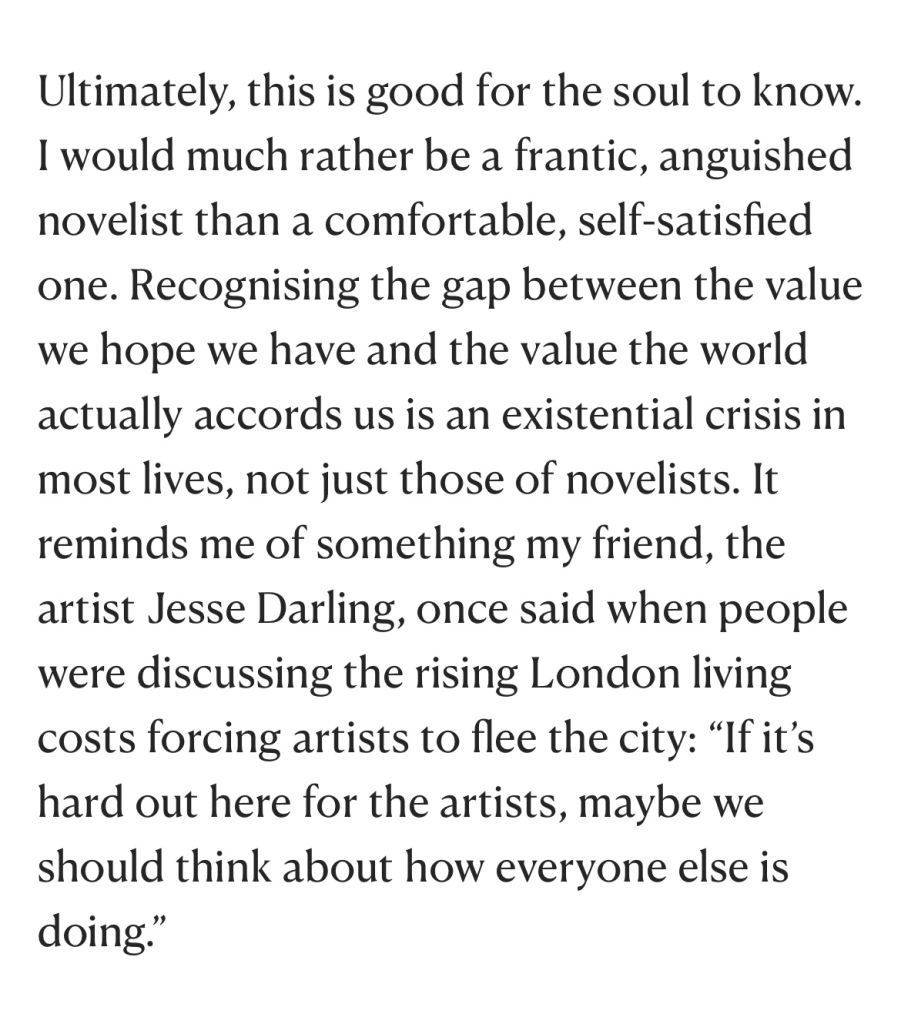
“Not really. I guess what I want is a chance to do all the things I said I was gonna do when I was really little. The things I forgot I wanted to do. Don’t worry, though. I’m still gonna act like I’m doing it. I’m still gonna sit down and write and practice my music and do my art. I’m gonna pick up contract gigs and pay rent and act as normal as possible. I’ll pay off my debts to my siblings so they don’t hate me anymore. I know they don’t hate me but, you know. And I’ll do my best. I’ll do my best until I can’t anymore and then I’ll just do okay and it’ll be fine. Okay, Marge?”
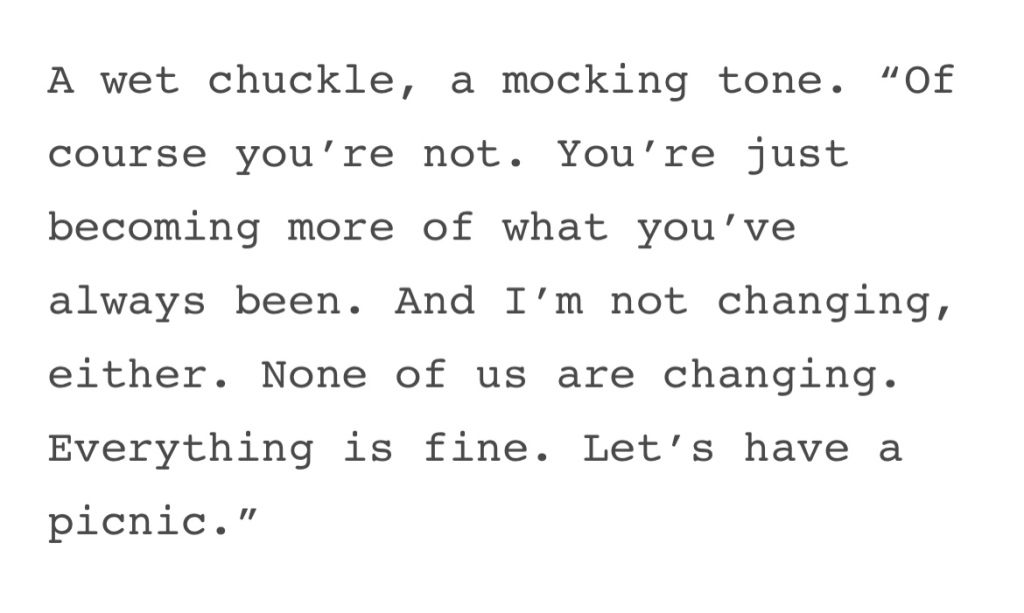
It matters that the baby trusts you with the future-tomatoes. It matters that you can stare directly into the sun without burning your eyes. It matters that you know how to be nice to people who go to church. It matters that you’re nice to strangers, in general. It matters that you drink your water and take your meds. It matters that you get your car fixed. It matters that you keep living, because you know you have no choice.
Sometimes you have to imagine that this is a movie. You’re not the main character, but you’re looking out for them. It’s important that you’re not the main character now, specifically, because when you peel back the inflamed layers of your heart, you feel a little bit pathetic. Well, a lot. And you let yourself feel pathetic and wretched and godawful because that’s important, too.
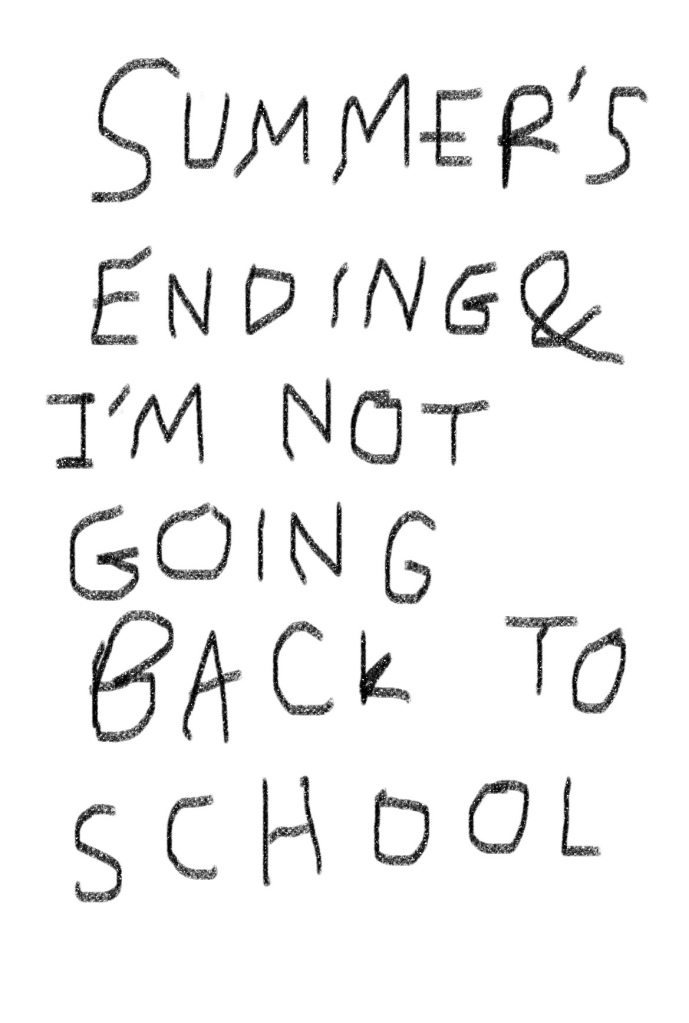
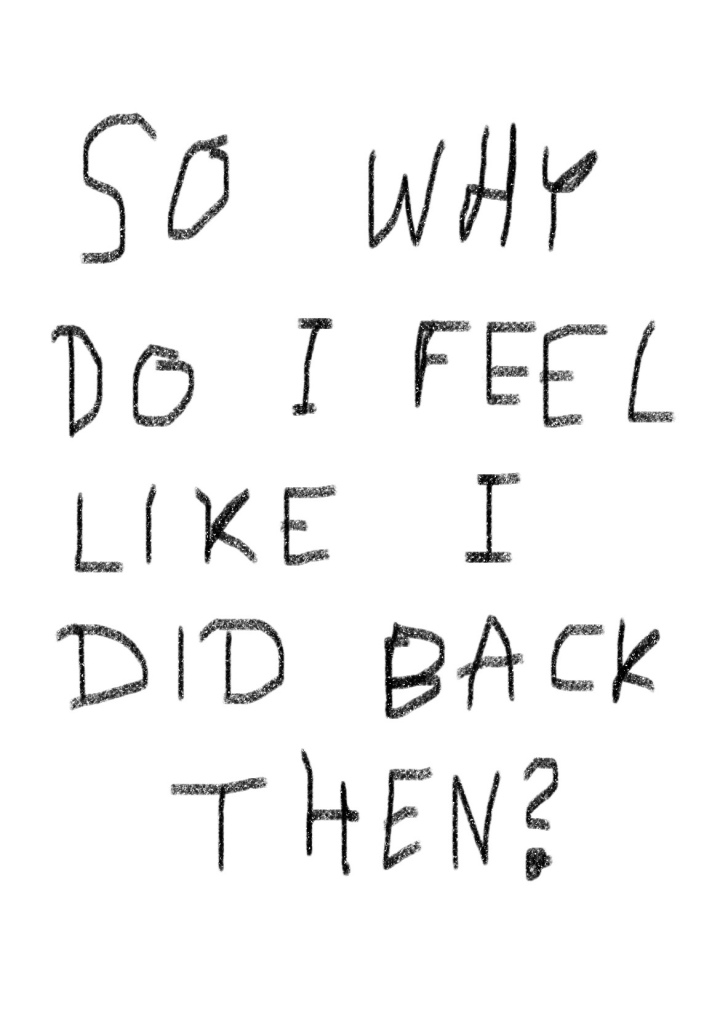
For some reason, you’ve been reminiscing on Netflix in the early days. Maybe it’s because streaming services have been mass-culling their movies and TV shows—even or especially if they’re exclusive to their “channels.” Maybe it’s because it’s August, and you have a subconscious association between Netflix and summers with your parents. Your dad and his wife lived in married student housing back when she was deepening her relationship with you and your biological siblings. It was a tiny basement suite in the U District of Seattle, Washington.
There was an oldish TV set on top of their cabinet. You would watch Mystery Science Theater 3000 until everyone was sick of you and it. Then you’d switch to something else. You and your family would flick through whatever Netflix offered pre-algorithm. A lot of indies. Really good ones, too. You probably wouldn’t recommend them to anyone, but they were well done and showcased people who, at least to you, looked realer than the sanctioned studio films.
Maybe you’re nostalgic for the way the late summer wafted in through the open windows at night. How your parents would stand out on the concrete back porch and smoke and talk and laugh quietly. Maybe you miss wrapping yourself in a Pendleton. Maybe you miss how much time you wasted wanting to be normal.
One image, one sense-memory keeps coming back to you. It’s some indie film you genuinely can’t remember. A white guy with sandy brown hair is in an office wearing business casual, gripping a mug. He’s saying something utterly banal and the equally white, somewhat less sandy-haired protagonist is narrating how bored he is with everything.
Outside, the streetlights flutter on and off and on again. You catch the scent of something cataclysmic on the wind. In your mind’s eye, you see something deep within the ocean turning in its sleep. Its snore rumbles the ocean floor. It is dreaming about you. Well, not really, but one of your ancestors who looks and acts a lot like you. You haul your father’s iBook out of wherever you’ve been keeping it and you open it up. You need to write it all down. All the visions of what’s to come. All the hope and fear and agony. You need to people the barren, cracked landscape of the future with what your parents call “a ragtag band of misfits.” They’ll know what to do.
You are thirteen years old. You have had a hell of a summer. You went to your first pride and almost got impaled on someone’s flag because they were dressed like a stormtrooper and didn’t see you. Across the city, your little sister was almost beheaded by a killer robot. These things happen. You won’t go to another pride again, at least not at the time of writing this. You’re thinking, right now, at age twenty-five, with no small measure of bitterness, about the lyrics to Sylvan Esso’s PARAD(w/m)E:
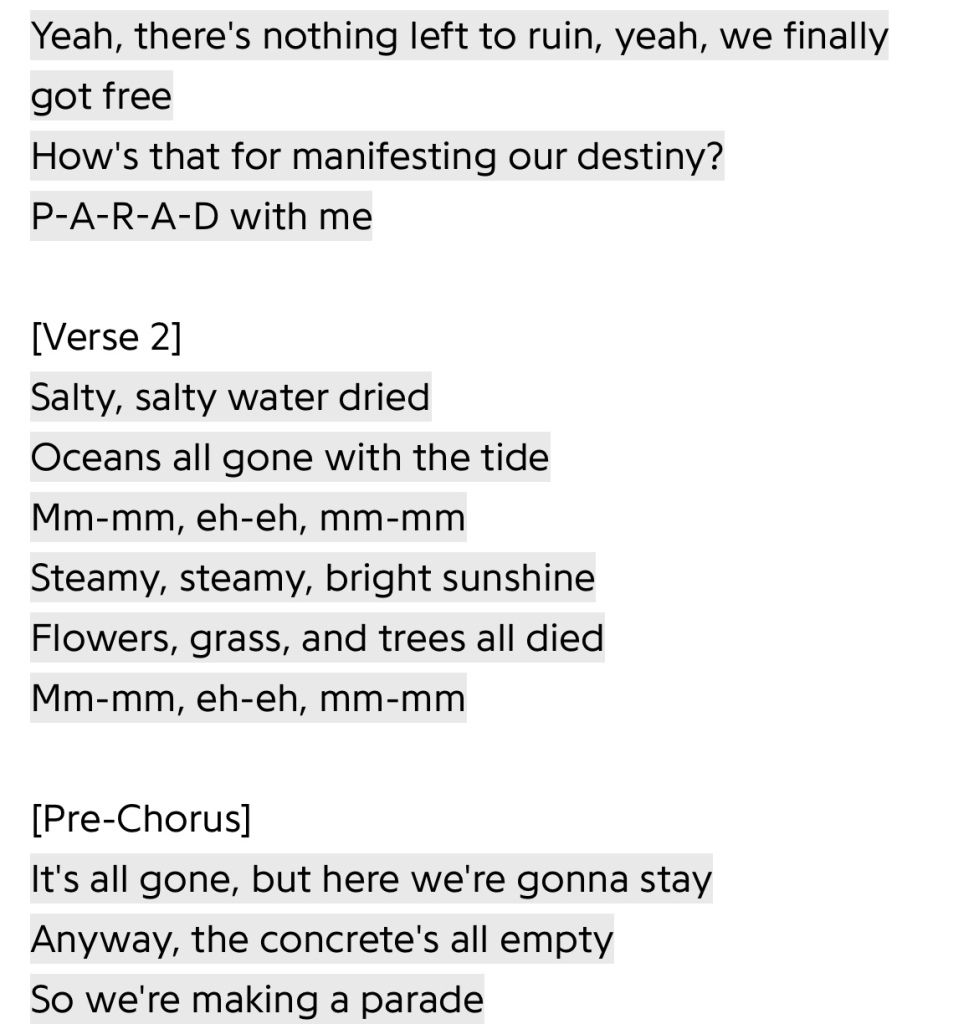
You wonder why white people have the right to be suicidally bored but you have to keep surviving. A couple days ago, you told the person you’ve been playing house with, “I feel like I’m not allowed to lose control. I feel like I’m not allowed to do anything anyone else does.” He reached across the space between you with his eyes and nodded. “Same.” You deflated. You wondered, not for the first time, where he’s been and where you’re going and why. Why any of it.
It all gets wrapped up in a pretty little bow. You in the sand and the baby in the sand. Every time they pop a bit of puffy plastic they shriek “It’s YOU!” before dissolving into giggles. You and the baby’s parents finish your work for the day and go to the casino for dinner. This is what you’ve done your whole life. For the first time, you actually notice the patrons of the casino. The ones who aren’t Indians. You ask your clan-cousin’s sibling where these people came from. They laugh, “I know, right?” And you laugh, too, because you’re not actually looking for an answer, you’re more just shocked that it took you this long to ask the question.
You say your farewells and you get in your separate cars and you look at the smoky, violent skyline like a boy comes home to someone he’s getting ready to break up with. All the love in the world and so much heavy resentment.
Are there tomatoes over there?
No.
But there will be.
Leave a comment